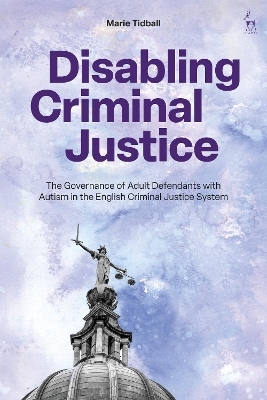
Disabling Criminal Justice
Hart Publishing (Verlag)
9781509956944 (ISBN)
Utilising the social model of disability, it considers the dominant strategies of governance, including ‘vulnerability’, which the author argues obscures the rights of disabled people in the criminal justice system. In doing so it sheds light on how this group should be governed.
Drawing on rigorously-researched case studies of autistic adult defendants through the court process, the book brings together relevant legal and policy literature, criminological and criminal justice theory and disability studies to provide insight into the ‘dividing practices’ that affect the governance of disabled defendants’ conduct.
Using interviews with elites and practitioners, textual analysis, and court observation of eight autistic adult defendants through their court process, the book investigates why the status of autistic defendants as disabled under the Equality Act 2010 has been overlooked in criminal justice policy and criminal court decision-making.
It explores the impact of the ‘collateral’ effects and ‘symbiotic harm’ of the criminal justice process on family members who support these defendants through the criminal justice process.
Marie Tidball is Founding Director and Coordinator of the Oxford University Disability Law and Policy Project, UK. She is also Research Associate at Wadham College and the Bonavero Institute of Human Rights, UK.
Foreword, Professor Lucia Zedner (University of Oxford, UK)
Foreword, Professor Anna Lawson (University of Leeds, UK)
1. Introduction: Autism, Criminality and the Criminal Justice System
2. Qualitative Methods and Inclusive Research Participation
Part 1: How Should Autistic Adult Defendants be Governed?
3. Disabling Criminal Justice: Developing a Theoretical Toolkit
Part 2: Strategies of Governance: Autistic Adult Defendants and Autism-Specific Policy
4. Disability vs Vulnerability in Liaison and Diversion
5. Mapping the Legislative Landscape: The Autism Act 2009, Autism Strategies and Statutory Guidance
Part 3: Technologies of Governance: Criminal Court Practice
6: Pre-trial Shaping: The Police, the Crown Prosecution Service and Decision to Prosecute
7. To What Ends are they Governed? Negotiating the Courtroom, Remand and Plea
8. Dividing Practices in Case Disposal: Aggravating and Mitigating Factors and Sentencing
9. Governance Through the Family: Collateral Impact and ‘Symbiotic Harm’ for Defendants’ Families
Part 4: ‘The Creation of Other Possible Ways of Living’
10. Conclusion: The Normative Case for Disabling Criminal Justice
| Erscheinungsdatum | 09.02.2024 |
|---|---|
| Verlagsort | Oxford |
| Sprache | englisch |
| Maße | 155 x 234 mm |
| Gewicht | 600 g |
| Themenwelt | Recht / Steuern ► Allgemeines / Lexika |
| Recht / Steuern ► Arbeits- / Sozialrecht ► Sozialrecht | |
| Recht / Steuern ► EU / Internationales Recht | |
| Recht / Steuern ► Strafrecht | |
| Sozialwissenschaften ► Politik / Verwaltung | |
| ISBN-13 | 9781509956944 / 9781509956944 |
| Zustand | Neuware |
| Informationen gemäß Produktsicherheitsverordnung (GPSR) | |
| Haben Sie eine Frage zum Produkt? |
aus dem Bereich


